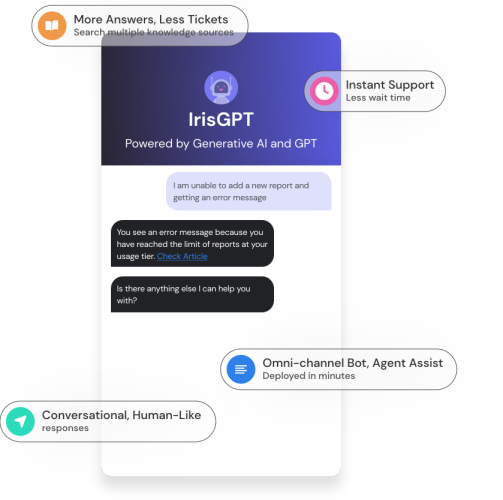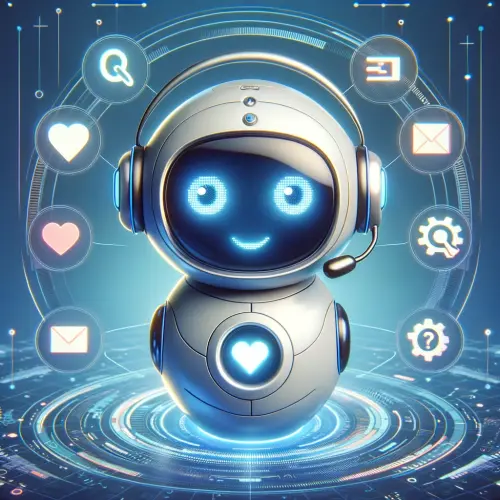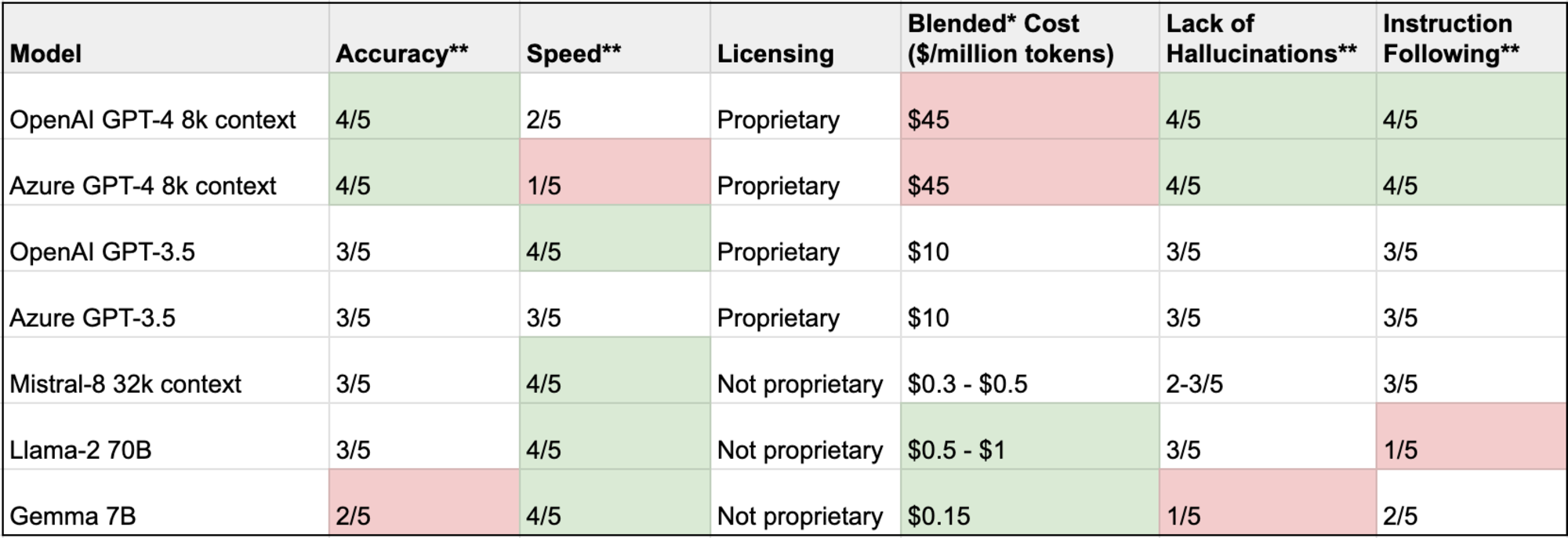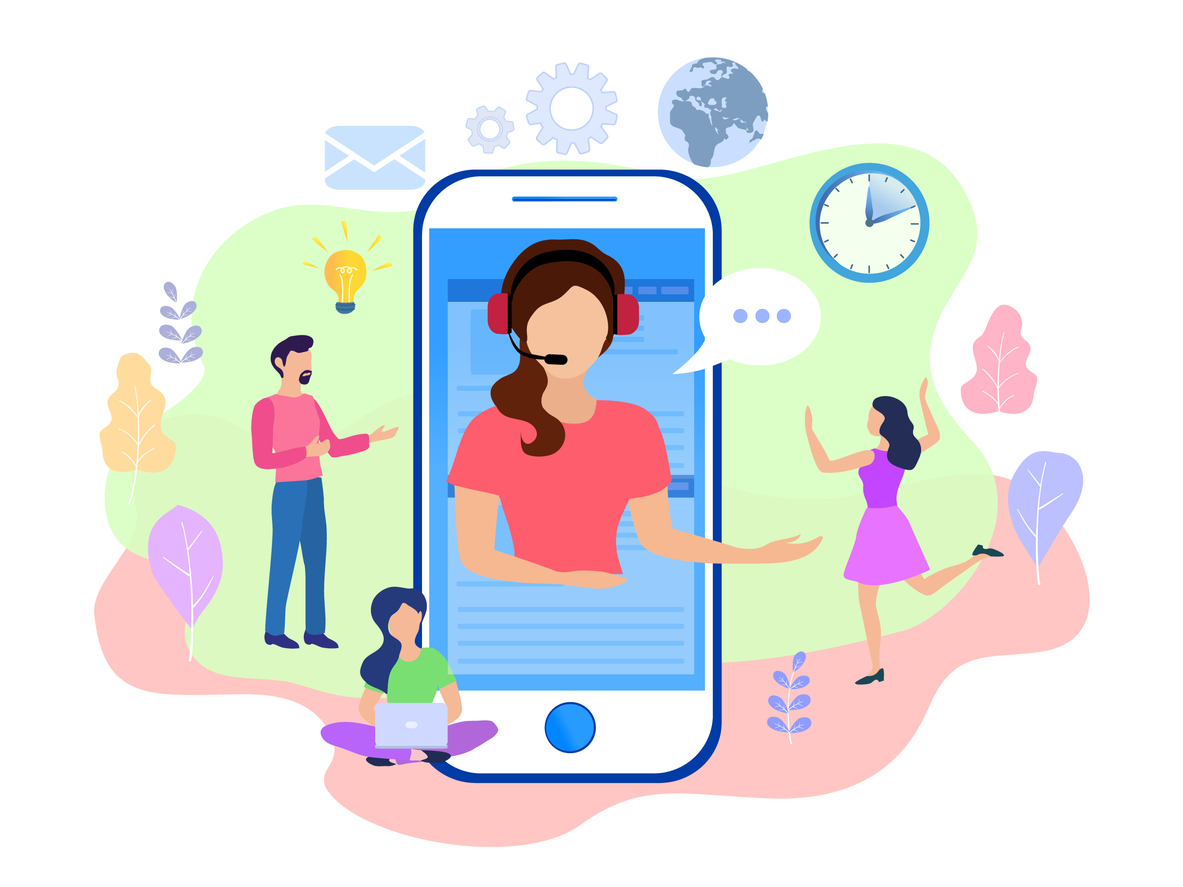Embracing the AI Chatbots Revolution: Unlocking the Future of Business 🚀
efficiency in task automation and the advent of Language Models (LLMs) have propelled its usefulness to new heights. One such groundbreaking application is AI chatbots. AI chat functionalities, powered by advanced models like OpenAI’s GPT, are a key feature of these bots. These AI chatbots are powered by various AI models, including GPT-3.5 and GPT-4, among others. They possess the capability to write code, compose emails, draft reports, generate art, and even create Excel formulas. Conversational AI chatbots, with their versatility and value, have revolutionized not just customer support but also content creation, web searching, and various business tasks, showcasing their broad applicability across different business objectives. These bots are underpinned by the advanced language model system of OpenAI’s GPT, enhancing their ability to perform a wide range of tasks effectively.
For the last three years, we at IrisAgent have been specializing in AI chatbots for customer support automation and workflows. Now, we’re ready to share our insights and secrets about chatbots.
What to Look for in an AI Chatbot?
When selecting an AI chatbot platform for your business, it’s crucial to consider several key features contributing to its effectiveness and functionality. These features may vary based on your specific use case and requirements, but here are some important ones to look for:
Natural Language Processing (NLP): Look for chatbot platforms offering advanced NLP capabilities, including entity recognition, sentiment analysis, and language understanding, to ensure accurate and meaningful interactions with users. Conversational AI chatbots, powered by advanced AI models, are designed to provide more personalized and efficient responses.
Integration Capabilities: Seamless integration with your existing systems, such as customer relationship management (CRM) software, messaging apps, and e-commerce platforms, is crucial. This allows the chatbot to access relevant data and provide personalized responses and recommendations based on user history and preferences. It's important to note that not all chatbots are AI-powered, emphasizing the unique capabilities of AI chatbots in understanding and processing natural language.
Security and Compliance: Since chatbots often have access to sensitive user information such as financial transactions or healthcare inquiries, security and compliance are paramount. Ensure that the chatbot platform adheres to industry-standard security protocols, such as encryption and access controls, and complies with relevant regulations, such as GDPR or HIPAA, depending on your industry.
Personal AI: Opt for chatbots equipped with personal AI capabilities, which act as digital clones by learning from the user’s data, facts, and opinions. This enables the chatbot to mimic the user’s thoughts and provide valuable support in tasks such as messaging, writing emails, creating content, and communicating in the user’s own voice and knowledge, offering a highly personalized support experience.
Selecting the best AI chatbot for your specific needs is essential, considering features like advanced NLP, seamless integration capabilities, strict security compliance, and personal AI to ensure the chatbot not only meets but exceeds your business requirements.
Any Best Conversational AI Chatbots in the Town?
During the development of IrisAgent, we had the opportunity to explore some exceptional chatbots widely used by businesses and individuals. Here are a few of them:
ChatGPT: ChatGPT, like the one you’re conversing with right now, is a free AI chatbot developed by OpenAI. It uses the GPT (Generative Pre-trained Transformer) architecture to generate human-like responses based on the input it receives. Available at no cost, ChatGPT can be used for a wide range of applications, including customer support, language translation, content generation, and more.
IrisGPT: IrisGPT is an AI-powered chatbot platform that specializes in customer service and support. It represents its own AI chatbot with a user-friendly interface for businesses to build and deploy chatbots tailored to their specific needs across multiple channels, including websites, messaging apps, and social media platforms. IrisGPT uses machine learning algorithms to understand user queries and provide personalized responses, helping businesses automate and streamline their customer support operations.

ManyChat: ManyChat is a popular chatbot platform that enables businesses to create Facebook Messenger chatbots for marketing, customer engagement, and lead generation. It offers a visual bot builder, customizable templates, and integration with various third-party tools and services. ManyChat’s drag-and-drop interface makes it easy for users to design and deploy chatbots without any coding knowledge.
Flow XO: Flow XO is a versatile chatbot platform that allows users to create AI-powered chatbots for websites, messaging apps, and voice assistants. It offers a visual flow editor, pre-built templates, and integration with popular services like Slack, Facebook Messenger, and Zapier. Flow XO’s flexible platform caters to businesses of all sizes, from small startups to large enterprises, looking to automate customer interactions and streamline workflows.
HubSpot Conversations: HubSpot Conversations is a part of HubSpot’s all-in-one marketing, sales, and customer service platform. It enables businesses to build AI-driven chatbots to engage with website visitors, capture leads, and provide support. HubSpot Conversations seamlessly integrates with HubSpot’s CRM and marketing automation tools, allowing businesses to track and manage customer interactions across channels.
Drift: Drift is a conversational marketing platform that helps businesses drive revenue through personalized customer conversations. It offers AI-powered chatbots for qualifying leads, booking meetings, and providing instant support. Drift’s chatbots leverage machine learning to understand user intent and behavior, enabling businesses to deliver targeted messages and recommendations in real time.
Bing AI and Microsoft Bing AI stand out as exemplary chatbots for web searching, offering conversational capabilities and seamless integration with other products. These chatbots excel in providing accurate, up-to-date search results and support natural, back-and-forth conversations. They are also noted for their text and image generation features, making them a top choice for users seeking an alternative to traditional online searches.
Google Bard, developed by Google, integrates closely with Google’s search engine and products like Docs and Gmail, enhancing text handling, summarizing, creating drafts, and brainstorming ideas. However, users should exercise caution as there have been instances of it providing false and misleading information.
Best Practices to Implement AI Chatbots ✅
While AI chatbots can greatly enhance customer engagement, streamline processes, and improve overall efficiency for businesses, successful implementation requires careful planning and execution. Here are some tips and best practices to consider:
Define Objectives: Clearly outline what tasks the chatbot will handle, such as customer support or lead generation.
Understand Audience: Research user preferences and needs to design a chatbot that resonates with them.
Design Flows: Create intuitive conversational paths, keeping the language simple and relevant.
Personalize Experience: Tailor responses to user preferences and behavior for better engagement.
Ensure Integration: Integrate with existing systems for seamless data access and accurate responses.
Understand How an AI Chatbot Operates: It’s crucial to grasp how an AI chatbot operates on an input-output model, processing user queries with artificial intelligence algorithms and analyzing the context to provide relevant responses.
Test Thoroughly: Rigorous testing ensures accuracy and reliability. Utilizing diverse and comprehensive training data is essential to enhance the chatbot's ability to understand and respond to user queries accurately, by leveraging insights from real-time data platforms and understanding trends, conversations, and user sentiment.
Provide Oversight: Maintain human oversight for complex queries, striking a balance between automation and human intervention.
Review Chat History: Regularly analyze chat history to refine the chatbot’s responses and functionality, enhancing the overall user experience.
Measure Performance: Track key metrics like engagement and satisfaction to continuously improve the chatbot.
Key Features of Effective AI Chatbots
To harness the full potential of AI chatbots, businesses must ensure that their chosen solutions possess certain critical features. These features not only enhance the functionality of the chatbots but also ensure they can operate effectively in diverse business environments. One such pivotal feature is the capability to create or customize your own chatbot. This allows businesses to tailor chatbot solutions that seamlessly integrate with existing systems and meet unique business requirements, providing a hands-on experience in building, customizing, and enhancing the chatbot solution as per individual needs and preferences. Among these, virtual agents stand out as a specialized type of AI chatbot, meticulously trained for customer service in call centers, representing a key component of conversational AI. Furthermore, the advent of virtual assistants, empowered by NLP, has revolutionized the way AI chatbots understand and engage in human conversation, enabling them to assist with complex tasks and offer personalized support as never before. Here are the key features that define effective AI chatbots:
Multilingual Support
In an increasingly global marketplace, the ability to communicate with customers in their native language is invaluable. Effective AI chatbots offer multilingual support, which allows businesses to expand their reach and cater to a broader audience. This feature uses advanced Natural Language Processing (NLP) algorithms to understand and respond accurately in multiple languages, ensuring that interactions are as smooth and natural as possible.
Integration Capabilities with Existing Systems
For AI chatbots to truly be effective, they must seamlessly integrate with a business’s existing systems—be it customer relationship management (CRM) software, enterprise resource planning (ERP) systems, or e-commerce platforms. This integration enables chatbots to access and retrieve necessary information, perform tasks such as scheduling, and update records in real-time. By automating these processes, chatbots enhance efficiency and reduce the likelihood of human error.
Scalability and Security Features
As businesses grow, their tools must scale accordingly. Scalable AI chatbots can handle increasing amounts of interactions without a drop in performance. This scalability ensures that the customer experience remains consistent regardless of volume fluctuations. On the security front, effective chatbots are equipped with robust security protocols to protect sensitive data. This includes compliance with international data protection regulations (like GDPR), secure data encryption, and regular security audits. These features are crucial for maintaining trust and safeguarding user privacy.
Advanced Personalization through Machine Learning and Natural Language Processing (NLP)
Personalization is a key differentiator in customer interactions. AI chatbots with advanced machine learning capabilities can analyze customer data, learn from interactions, and tailor responses based on individual preferences and past behaviors. This level of personalization makes interactions feel more engaging and relevant, significantly enhancing customer satisfaction. Moreover, these adaptive learning capabilities mean that the chatbot improves over time, continually refining its responses and strategies to better meet customer needs.
Together, these features form the backbone of an effective AI chatbot system. They ensure not only the practical day-to-day functionality of the chatbots but also enhance the strategic value they bring to businesses, paving the way for deeper customer engagement and operational efficiency.
How Does the Future Look? 🔮
As technology continues to evolve, AI chatbots are poised to undergo significant advancements and innovations. Extrapolating their evolution in the last two years, here are some future trends that we can expect in this field:
Integration of Voice Assistants: Deeper integration with voice assistants enables natural language interactions via voice commands.
Increased Personalization: AI chatbots will offer more personalized experiences, leveraging advanced algorithms to tailor responses and recommendations based on user preferences.
Enhanced Natural Language Understanding: Improvements in natural language processing will enhance chatbots’ ability to understand and respond contextually to user queries. Future AI chatbots will improve their ability to process and respond to human language, thanks to advancements in NLP technology.
Generative AI chatbots will play a crucial role in this evolution, offering human-like responses and natural conversation abilities, further personalizing user experiences with capabilities like creating tables of data and crafting text messages using ChatGPT plug-ins.
Seamless Omnichannel Experience: Users will enjoy seamless interactions with chatbots across various platforms and devices, maintaining continuity in conversations.
Augmented Human Collaboration: AI chatbots will augment human capabilities, enabling more efficient collaboration between humans and machines.
In conclusion, if implemented correctly, AI chatbots have the potential to radically transform your business, offering customers human-like expressions in textual or audio forms. Whether it’s emotional intelligence or the ability to understand the nuances of conversations, AI chatbots hold the promise of an exciting future.
Frequently Asked Questions (FAQs)
What is an AI chatbot?
An AI chatbot is a software application that uses artificial intelligence, particularly natural language processing (NLP), to understand and respond to human input in a conversational manner. These bots can perform a variety of tasks, such as answering questions, providing customer support, and facilitating transactions.
How can AI chatbots benefit my business?
AI chatbots can significantly enhance business operations by providing round-the-clock customer service, reducing response times, and handling multiple customer interactions simultaneously. This leads to increased efficiency, reduced operational costs, and improved customer satisfaction.
Are AI chatbots secure?
Yes, reputable AI chatbots are designed with security in mind. They employ various measures such as data encryption, secure APIs, and compliance with privacy laws (like GDPR) to protect user data. However, it’s crucial to choose providers that adhere to the highest security standards.
Can AI chatbots understand and speak multiple languages?
Many AI chatbots are equipped with multilingual capabilities, allowing them to converse in several languages. This feature is particularly valuable for global businesses looking to provide support and engage customers across different geographical locations.
What industries are using AI chatbots?
AI chatbots are widely used across various sectors including retail, healthcare, finance, education, travel, and real estate. They are adaptable to virtually any industry where customer interaction is key.
How do I integrate an AI chatbot into my existing systems?
AI chatbots can be integrated through APIs with existing business systems such as CRM software, databases, and e-commerce platforms. Many chatbot platforms offer customizable integrations that can be tailored to meet specific business needs.
Will AI chatbots replace human employees?
While AI chatbots can automate many tasks, they are generally used to complement human efforts, not replace them. Chatbots handle routine inquiries, which frees up human employees to focus on more complex issues and strategic tasks.
How do I choose the right AI chatbot for my business?
Selecting the right AI chatbot should involve considerations of the bot’s language processing capabilities, ease of integration, customization options, scalability, security features, and the specific needs of your industry. It’s also advisable to request demos and pilot programs from providers to ensure their solutions meet your requirements.
Can AI chatbots provide personalized experiences?
Yes, advanced AI chatbots leverage machine learning and data analytics to provide personalized interactions. They can remember user preferences, analyze past interactions, and use this information to tailor conversations and recommendations.
What should I do if the AI chatbot fails to resolve an issue?
It’s important to have a fallback plan, such as escalating complex issues to human agents. Ensuring that the chatbot can seamlessly hand off more complicated inquiries to human staff is essential for maintaining customer satisfaction.
This FAQ section aims to clarify common questions and help businesses feel more comfortable and informed about integrating AI chatbots into their operations.






